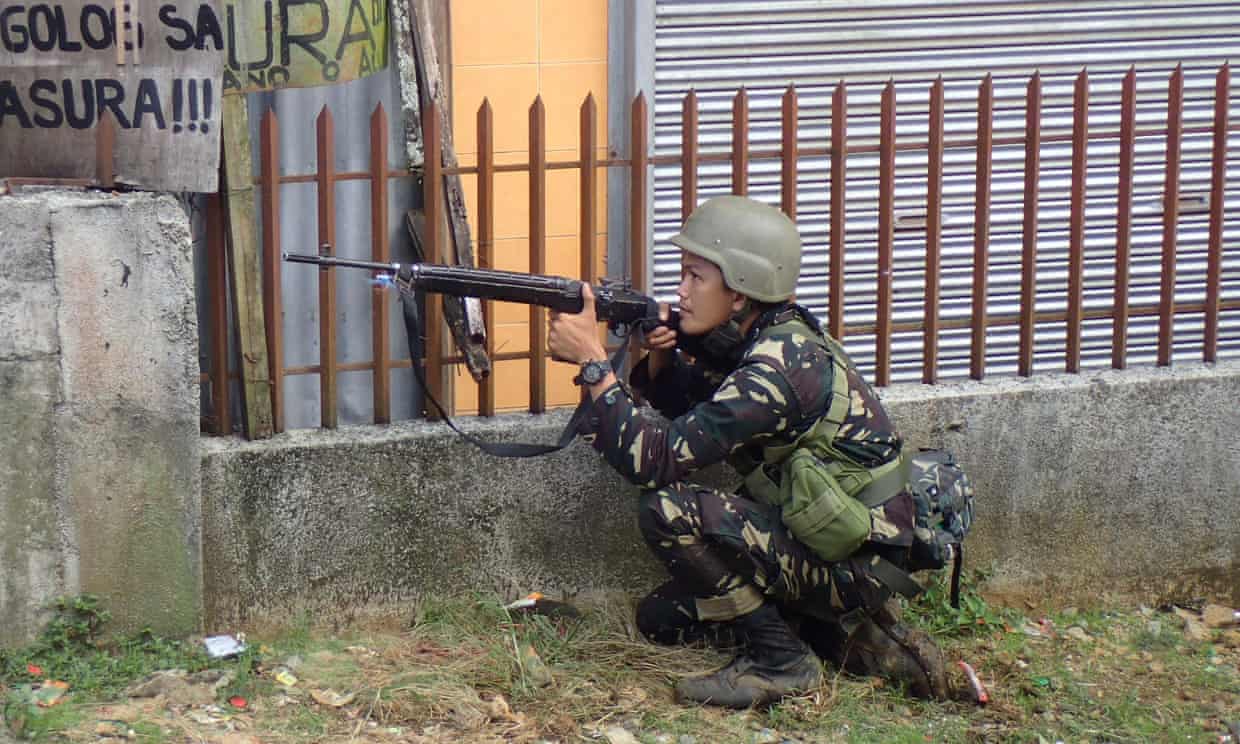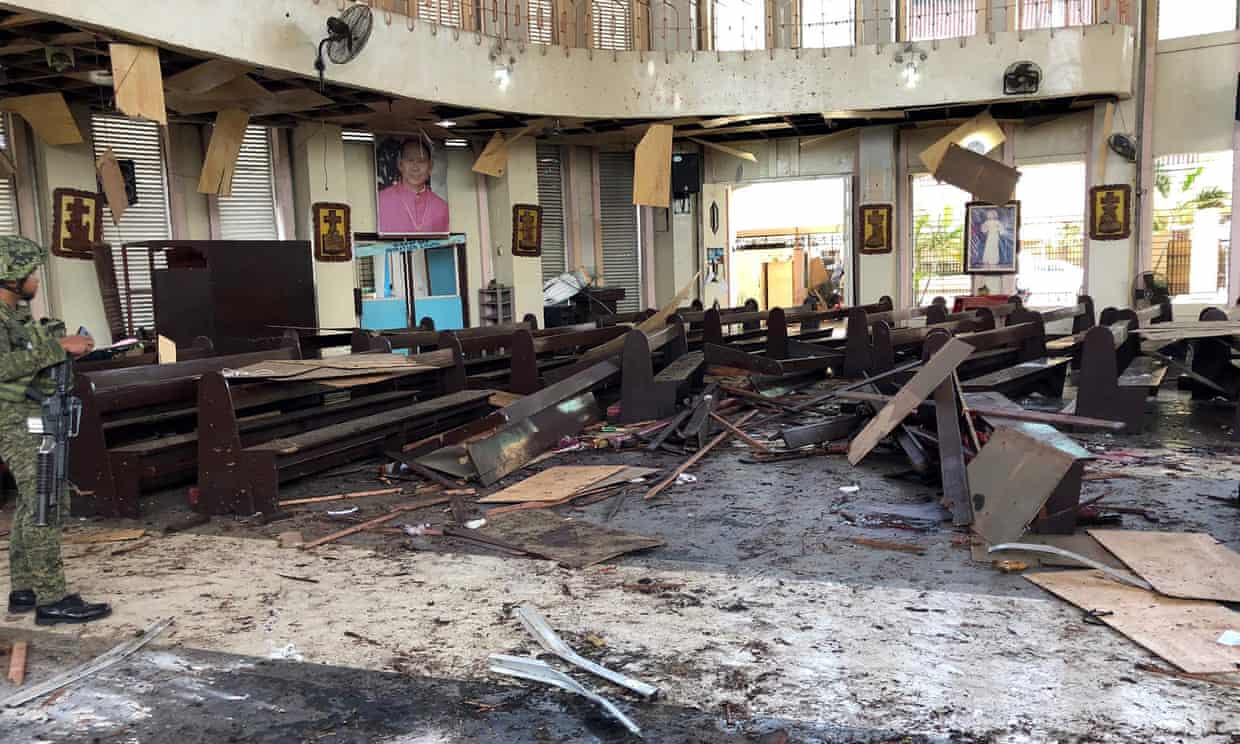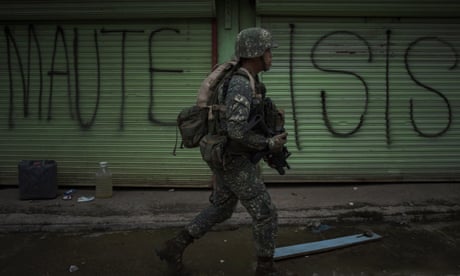Warning from military commander comes after spate of attacks including deadly church bombing

The comments come just over a year after Isis was defeated in Marawi City, after a five-month battle with government forces (pictured). Photograph: Pacific P/REX/Shutterstock
A military commander in the Philippines has warned that the country’s fight against Isis is far from over after a deadly church bombing on the island of Mindanao involving local militant groups that have pledged allegiance to the jihadist group.
The warning from military commander Colonel Romeo Brawner comes just over a year after Isis was defeated in Marawi City, in the south of the country, after a five-month battle between government forces and Isis-affiliated militants.
The Philippine government is continuing to search for the last known surviving leader of the main force behind the siege – Maute Group’s Owaidah Benito Marohombsar, known as Abu Dar, following the discovery of his training camp.

Twin explosions kill 20 people at Philippines cathedral
“The fight against Isis is not over. When I got assigned here, I said my priority is to hunt down Abu Dar and prevent him from recruiting and training more fighters,” Brawner told the Guardian.
In January, a spate of incidents led to fears of the group’s resurgence. On 25 January, violence erupted between government forces and a group led by Abu Dar. The military claimed “big success” for killing three terrorists and dismantling the training camp, even as Abu Dar managed to flee.
Two days later, twin bombings ripped through the Cathedral of Our Lady of Mount Carmel in Jolo, on Sulu island in the south-western tip of Mindanao, killing 23 people attending a Sunday mass and wounding 109 others.

Two bombs hit the church in Sulu in January. The first blast occurred inside the church as mass was being celebrated, and was followed by a second explosion in the parking lot as troops responded. Photograph: HANDOUT/AFP/Getty Images
In the days between the skirmish and the bloody church attack, Isis issued a bulletin, the first since the fall of Marawi in 2017, which claimed more than 30 soldiers had died in the clashes with Abu Dar’s men – a claim Brawner says is false – and issuing what was later interpreted as a warning for the church attack.
“Let the worshippers of the Cross and their helpers everywhere know that the Islamic State continues to break their thorn and smash their crosses and idols, and Allah is the granter of success and He is the helper,” said the message translated by the Site Intelligence Group which monitors jihadist activities.
Isis is a clear and present danger to the Philippines Rommel Banlaoi, Philippine Institute for Peace, Violence and Terrorism
The attack came as people in the Muslim-majority south Philippines voted in a historic referendum to create a new autonomous region, which the government hoped would bring peace to a war-torn part of the country and address issues that lure recruits to Isis-inspired groups.
According to the military, the church bombing was perpetrated by Indonesian suicide bombers and was planned and executed with the assistance of the Abu Sayyaf group.
The Abu Sayyaf group has been responsible for decades of violence, including the 2004 Superferry bombing that killed 116 people, making it south-east Asia’s worst terror attack at the time.
It is a highly factionalised group and is divided over its views on Isis, but sub-commanders like the late Isis emir Isnilon Hapilon reached out to develop ties.

Philippines: scores of Islamic State fighters on Mindanao island
The Sulu attack created a frenzy in the Isis propaganda machine, with the group publishing a photograph edited to show President Rodrigo Duterte as an Isis captive in the wake of his threats against the group. Duterte has said: “The only way to fight them is to become evil also.”
Rommel Banlaoi of the Philippine Institute for Peace, Violence and Terrorism said the Jolo church attack underscored the growing security challenge for the country, at the hands of foreign fighters, citing the blast in Lamitan City by a suspected suicide bomber from Morocco in July 2018.
“Isis is a clear and present danger to the Philippines being a new land of jihad by foreign fighters,” he said.
The challenge is underscored by the presence of about 100 foreign fighters in Mindanao, influencing local armed groups.
Lieutenant General Arnel Dela Vega, overall commander of areas where Isis-linked groups operate, said Duterte had ordered the military to “wipe out” the groups.
“We will further intensify intelligence efforts, collaborate with all concerned stakeholders, and cooperate and coordinate with counterpart Asian armies for common boundary security and intel sharing,” Dela Vega told the Guardian.
https://www.theguardian.com/world/2019/feb/08/the-fight-is-not-over-fears-of-isis-resurgence-in-philippines

No comments:
Post a Comment
Note: Only a member of this blog may post a comment.